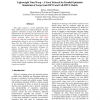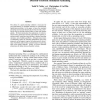57 search results - page 1 / 12 » Optimizing time warp simulation with reinforcement learning ... |
156
click to vote
WSC
2007
15 years 5 months ago
2007
Adaptive Time Warp protocols in the literature are usually based on a pre-defined analytic model of the system, expressed as a closed form function that maps system state to cont...
127
Voted
WSC
1998
15 years 4 months ago
1998
The Time Warp protocol is considered to be an effective synchronization mechanism for parallel discrete event simulation (PDES). However, it is widely recognized that it suffers o...
143
Voted
DSRT
2008
IEEE
15 years 4 months ago
2008
IEEE
This paper proposes a novel Lightweight Time Warp (LTW) protocol for high-performance parallel optimistic simulation of large-scale DEVS and CellDEVS models. By exploiting the cha...
136
Voted
FLAIRS
2010
15 years 24 days ago
2010
The choice of a good annealing schedule is necessary for good performance of simulated annealing for combinatorial optimization problems. In this paper, we pose the simulated anne...
119
Voted
NIPS
2001
15 years 4 months ago
2001
Policy gradient methods for reinforcement learning avoid some of the undesirable properties of the value function approaches, such as policy degradation (Baxter and Bartlett, 2001...


